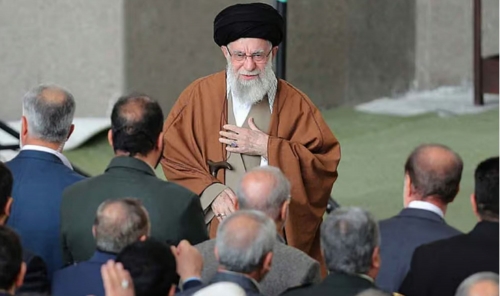Iran Warns of Nuclear Escalation if Attacked Amid U.S. Threats
TDT | Manama
Email : editor@newsofbahrain.com
Iran would be forced to pursue nuclear weapons if attacked by the United States or its allies, an adviser to Supreme Leader Ayatollah Ali Khamenei warned on Monday, following renewed threats from U.S. President Donald Trump.
Ali Larijani, a senior adviser to Khamenei, made the statement on state television, emphasizing that Iran is not currently seeking nuclear weapons but would have "no choice" if its security was compromised.
"We are not moving towards (nuclear) weapons, but if you do something wrong in the Iranian nuclear issue, you will force Iran to move towards that because it has to defend itself," Larijani stated.
His remarks come in response to Trump’s recent warning that the U.S. would launch airstrikes on Iran if it did not agree to a nuclear deal.
Trump Threatens Bombing
During a speech on Saturday, Trump declared, “There will be bombing” if Tehran refuses to negotiate, NBC News reported. He also hinted at imposing additional economic penalties, referring to them as "secondary tariffs."
Though Trump’s comments suggested military action, it remains unclear whether he was referring to direct U.S. strikes or a coordinated effort with Israel, Iran’s long-standing regional rival.
Khamenei, in a speech marking the end of Ramadan, dismissed Trump’s threats and warned of retaliation.
"If it is carried out, they will definitely receive a strong counterattack," the Iranian leader asserted.
Iran Vows Retaliation
Iran has formally condemned Trump's remarks in a letter to the United Nations Security Council. Iran’s UN ambassador, Amir Saeid Iravani, stated that Tehran "will respond swiftly and decisively to any act of aggression or attack by the United States or its proxy, the Israeli regime."
In a separate move, Iran’s foreign ministry summoned the Swiss chargé d'affaires—who represents U.S. interests in Tehran—to protest the escalating rhetoric.
General Amirali Hajizadeh, a senior commander in the Islamic Revolutionary Guard Corps (IRGC), warned Washington against escalating tensions.
"The Americans have at least 10 bases in the region around Iran, and they have 50,000 troops," Hajizadeh said. "Someone who is in a glass room shouldn't throw stones at anyone."
Diplomatic Channels Still Open
Despite rising tensions, diplomatic backchannels remain active. Trump reportedly sent a letter to Khamenei on March 7 through a United Arab Emirates envoy, urging negotiations. Iran responded through Oman, which has historically acted as an intermediary between the two nations.
Iranian Foreign Minister Abbas Araghchi confirmed that a response was delivered but reiterated Tehran’s stance: "Iran will not engage in direct talks under maximum pressure and the threat of military action."
However, Araghchi hinted that indirect negotiations could still be possible, signaling a potential diplomatic opening amid heightened military threats.
Beyond the nuclear issue, Iran continues to face accusations from Western nations of supporting proxy forces in the region—charges Tehran denies.
Khamenei, in his latest remarks, condemned Israel, calling it "the only proxy force in the region" and renewing calls for its "eradication."
With tensions at a boiling point, the coming weeks may determine whether the conflict escalates into military action or if diplomatic channels can defuse the crisis.
Related Posts

